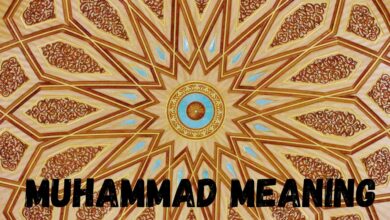Who are the Descendants of Ishmael Today?
Tracing the Legacy: Ishmael's Descendants in Today's World

Introduction
The story of Ishmael, a prominent figure in the Abrahamic traditions, holds a significant place in the historical and cultural narratives of many societies. As the eldest son of the patriarch Abraham, Ishmael’s lineage has been a subject of curiosity, debate, and exploration for centuries. Today, the descendants of Ishmael, known as Ishmaelites or Ishmaelites, continue to play a role in shaping the diverse tapestry of the world’s populations. This article delves into the history, identity, and contemporary presence of the descendants of Ishmael, shedding light on their diverse backgrounds and contributions.
Historical Origins
According to the Hebrew Bible, the Quran, and various Islamic traditions, Ishmael was born to Abraham and his wife Sarah’s Egyptian maidservant, Hagar. Ishmael’s birth was considered a fulfillment of God’s promise to make him a great nation, alongside the promise of a son born from Sarah, who would become Isaac. The rivalry between Isaac and Ishmael, as well as their descendants, has become a cornerstone of the Abrahamic narrative, illustrating themes of sibling relationships, divine promises, and cultural identities.
The Arab Connection
The most prominent group traditionally associated with the descendants of Ishmael is the Arab people. Arabs are believed to trace their lineage back to Ishmael through various genealogical accounts found in Islamic texts and Arabian traditions. The Arab world, spanning across the Middle East and North Africa, has been a cradle of civilization and played a pivotal role in shaping global history. From the development of early mathematical and scientific knowledge to significant contributions in literature and philosophy, the Arab world’s legacy is deeply intertwined with Ishmaelite heritage.
Contemporary Presence
In the modern era, the descendants of Ishmael are dispersed across various nations and cultures, each contributing to the socio-political, economic, and cultural landscapes of their respective regions. While it’s important to note that not all individuals in these regions identify as Ishmaelites or are directly aware of their ancestral connection, the historical ties remain an essential part of their collective identity.
- Arab Nations: The Arab world, including countries like Saudi Arabia, Egypt, Jordan, and Iraq, maintains a strong connection to the Ishmaelite lineage. Arabic, the language spoken throughout the region, is a linguistic testament to this heritage. Arab nations have a rich cultural heritage encompassing music, art, literature, and architecture that reflects their historical roots.
- North Africa: Nations such as Morocco, Algeria, Tunisia, and Libya also share a connection to Ishmael through their Arab identity and cultural ties. Berber populations in North Africa also have a historical connection to the broader Arab world, further diversifying the region’s cultural landscape.
- The Diaspora: The Arab diaspora has brought Ishmaelite heritage to countries around the world, influencing everything from cuisine to fashion. In Western countries, Arab communities often blend their traditional practices with contemporary cultural norms, showcasing the resilience and adaptability of Ishmaelite identity.
- Islamic Influence: The Islamic faith, which originated in the Arabian Peninsula, has been a unifying force for many Ishmaelite-descended communities. Muslims worldwide share a spiritual connection to the land where Ishmael lived, strengthening their ties to his lineage.
Conclusion
The story of Ishmael and his descendants continues to unfold across continents and generations, leaving an indelible mark on the tapestry of human history. The narrative of Ishmael carries deep meaning for millions of people around the world, whether they are aware of their ancestral connections or not. The contributions of the descendants of Ishmael, from cultural achievements to historical legacies, remind us of the interconnectedness of humanity and the enduring impact of our shared past.
As societies evolve and cultures intermingle, the descendants of Ishmael remain a bridge between history and the present, enriching the global mosaic of human diversity and heritage. By acknowledging and celebrating this lineage, we honor the intricate web of relationships that bind us together as a global family, rooted in shared narratives and interconnected destinies.
Who are the descendants of Ishmael today?
The descendants of Ishmael are believed to be the Arab people, comprising various ethnic groups across the Middle East and North Africa. They are linked by cultural, linguistic, and historical ties.
Who was Ishmael in biblical history
Ishmael was the son of Abraham and Hagar, Sarah’s maidservant. He is considered a significant figure in the Abrahamic traditions, being one of the forefathers of the Arab people.
What regions do the descendants of Ishmael primarily inhabit?
The descendants of Ishmael predominantly inhabit the Arabian Peninsula, including countries such as Saudi Arabia, Yemen, Oman, United Arab Emirates, Qatar, Kuwait, and Bahrain. They also reside in other parts of the Middle East and North Africa.
What are some of the notable Arab ethnic groups descended from Ishmael?
There are several Arab ethnic groups that trace their lineage back to Ishmael, including but not limited to the Saudis, Yemenis, Bedouins, Palestinians, Jordanians, and Emiratis.
What languages do the descendants of Ishmael speak?
The descendants of Ishmael primarily speak Arabic, which has numerous dialects and variations across the regions where they reside. Modern Standard Arabic is often used for formal communication and written texts.
How has the history of the descendants of Ishmael shaped the Arab world?
The history of the descendants of Ishmael is intertwined with the development of the Arab world. Their contributions to culture, language, trade, religion, and politics have left a lasting impact on the region’s history and identity.
What religions are practiced among the descendants of Ishmael today?
The majority of the descendants of Ishmael today practice Islam, with various sects and interpretations. However, there are also smaller communities of Christians and adherents of other religions within the Arab world.
How has the oil-rich Arabian Peninsula influenced the descendants of Ishmael’s modern lifestyles?
The discovery of oil in the Arabian Peninsula has significantly impacted the economies and lifestyles of the descendants of Ishmael. Oil wealth has led to rapid development, urbanization, and economic diversification in many Arab countries.
How do the descendants of Ishmael maintain their cultural heritage in the modern era?
The descendants of Ishmael often maintain their cultural heritage through practices like traditional clothing, food, music, and dance. Cultural events, festivals, and celebrations play a crucial role in preserving their identity.
What are some challenges faced by the descendants of Ishmael today?
The descendants of Ishmael, like any other group, face a range of challenges including political instability, conflicts, economic disparities, social changes, and the balance between modernization and preserving cultural values.





